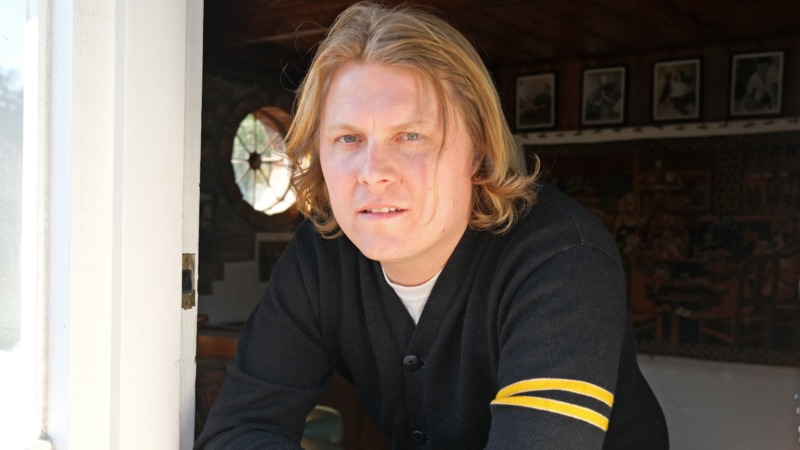The Guitar Heroes of Ty Segall
Since his debut as a solo artist 17 years ago, Segall has become a prominent torchbearer for classic rock’s greatest instrument. With the release of his 16th studio album Possession nearing, the prolific SoCal shredder spoke with Paste about the pickers who’ve influenced him most.
Photo by Denée Segall
Ty Segall is the kind of artist to let his guitar do his talking. Quite literally—the most recent time I saw him perform in London, he failed to say a single word to the audience, eschewing banter in-between songs in favor of rupturing eardrums and boggling brains with his fretwork for the entire set. The prolific SoCal musician is also fairly selective when it comes to interviews. With the rapid rate in which he writes, records, and releases albums, you’d think the sheer volume of interview requests that come with the territory would no doubt be a deterrent. Shucks, by the time this interview’s eventually published he could have very well announced another new album. A bit heavy on the hyperbole, for sure, but you can’t rule out that being the case.
“I’m not the biggest fan of interviews because I really don’t like talking about myself. That’s the main thing really,” Segall tells me from his moving car, as he and wife Denée carry out family errands—a fitting scenario for an artist who’s seemingly always moving on to his next venture. “The vibe when I make music is like ‘Hey, let the music speak for itself,’ but I know that’s not fair. I’m down for some interviews.” The opportunity to wax lyrical about his own guitar heroes was obviously too good to pass up.
Since the garage rock revivalist’s 2008 eponymous debut album as a solo artist, Segall has become a prominent torchbearer for classic rock. Flitting between garage rock, psych, prog, proto-metal, and glam rock, his own irrepressible creativity is steeped in the legacy of the artists he embraced from a young age. As Segall’s career has unfolded however, he’s continued to plunder weirder depths. 2024’s Love Rudiments, for instance, was an odd, percussion-oriented album—an anomalous entry into the musician’s expanded universe. But with his forthcoming 16th studio album Possession, Segall has picked up from the woozily hypnotic thread of 2024’s acid-laced Three Bells. It’s an album richer in lush orchestration and fuller in narrative cohesion than any of his previous work.
For Possession, Segall brought filmmaker Matt Yoka into his inner circle of musical collaborators. The pair have already worked together on the 14-minute short film accompanying 2016’s Emotional Mugger, with Segall providing the music to Yoka’s 2020 documentary Whirlybird. Never an artist to shy away from forging new creative alliances in the studio, Segall sought his friend’s perspective, with Yoka eventually co-writing the album’s American noir-influenced literary lyrics. “You never know how a new collaboration is gonna go, but when we started working with each other we were like, ‘This is great, let’s keep this going,’” he recalls. “I wanted to make a record with songs that had a different lyrical edge, a storytelling theme.”
It’s Segall’s combustible guitar work that fuels the furnace of his musical curiosity once again on Possession. So, for an artist that has relentlessly shredded away at the perceived limitations of garage rock, we talked with him about the guitarists that inspired him to pick up the instrument in the first place, the guitarists that influence him still, and the guitarists which he thinks are making some of the most interesting music today.
Greg Ginn
Ty Segall: I’d probably say it was a Black Flag song that inspired me to pick up the guitar. Probably “Nervous Breakdown,” because I thought it was one of the coolest songs ever made. It still is. That style I’ve kept in my back pocket throughout my entire career. That free psycho chaos. People talk about the jazz thing with him, his jazz style of soloing. Just as much as someone’s style or riffs, it’s the sound. I definitely thought it was the sound that inspired me.
Paste: You learned drums first, so was Ginn instrumental in you switching to the guitar?
I got into punk music, and it went from being into Sabbath or hard rock that was all about proficiency or being able to do crazy riffs. Then you get into punk and it’s about attitude. It’s inclusive, in the sense that if you don’t know how to play, you still can. It was a great way to get into the guitar, as I only had to really learn three chords.
Tony Iommi
Tony Iommi is a huge, huge influence. Well, Black Sabbath in general for all the instruments I play. I don’t remember when I started tuning my guitar down, but I feel like he’s the reason why I tune my guitar down. Somebody else I saw tune their guitar down to D standard. I definitely know that Sabbath tuned their guitars down, but I’m not sure if it’s D standard. I tune my guitar to D standard. Long story short: I’m really into how the tension feels and specifically how heavy it is. I just love melodic heaviness. Iommi, the riff master.
-

-

-

-

-

-

-

-

-

-

-

-

-

-

-

-

-

-

-

-

-

-

-

-

-

-

-

-

-

-

-

-

-

-

-

-

-

-

-

-








































